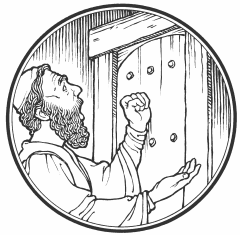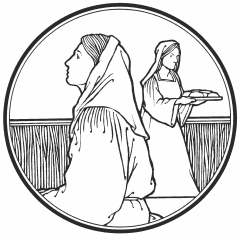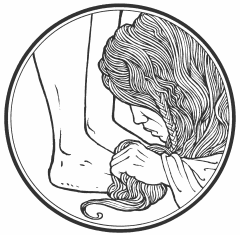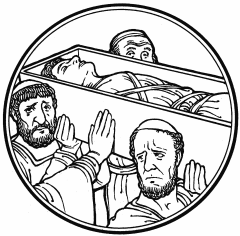Grace, mercy, and peace to you from God our Father, and from our Lord and Savior, Jesus Christ, amen. The text for the sermon is the Gospel, which was read earlier.
One of the major problems that has affected the Church throughout the ages is the doctrine of predestination and election. It says that God has predestined some to be saved and He has predestined some to be damned. If you are predestined to be saved, then good for you. If you have been predestined to be damned, then that is rather unfortunate for you. All of this has been determined since before the foundation of the world. A person’s election is not based on any good works or act of the elect, but solely on God’s grace.
The problem with the doctrine of predestination as presented here is that it goes contrary to what Scripture says. St. Paul writes to Timothy, “This is good, and it is pleasing in the sight of God our Savior, who desires all people to be saved and to come to the knowledge of the truth.”
As Jesus answers the question regarding salvation, Jesus gives an answer involving a narrow door. Narrow doors don’t allow a mad rush of people to enter all at once. Entrance is gained by going through the door one at a time. What does Jesus mean here? The narrow door is a symbol for Jesus Himself. One enters the gates of heaven by Jesus Christ, and Jesus Christ alone. Our Lord emphasizes to the people that they should “strive to enter through the narrow door.”
The reason why He says that is because the people had many doors which they could enter by that would lead to salvation, at least in their own mind. You had the door of the Pharisees that was marked by keeping the Law perfectly. The only problem here was the only people who would enter through this door were the Pharisees themselves because they were the only ones who could keep the Law perfectly, at least in their own eyes. You also had the door marked by works, that somehow, you could do enough to please God and that He would grant you entry into heaven. There is also the door marked by the world. This is the path to heaven that one achieves on account of the things in this world, whatever they might be.
The many doors into heaven at the time of Christ are very much present for the Church today. Somehow, if we are good enough and nice enough, then God will allow us to enter heaven. Somehow, if we do enough to please God, He will have mercy on us and grant us entry in heaven. If we find the right thing in the world, that will be our key into heaven. But instead of being the narrow door into heaven, they all prove to be the wide way to hell. You can never do enough. You can never be good enough. There is nothing in the world that will gain a person entry into heaven. The only means of eternal life is the narrow door of Jesus Christ. In today’s Gospel, Jesus tells us that the truth is that there is one door that leads to eternal life. The rest of the Bible tells us that Jesus Himself is that door. Jesus said… “I am the way, and the truth, and the life. No one comes to the Father except through me.” Jesus made Himself the way with His perfect life and His sacrificial death. He certified that He is the truth by returning to life after He died.
The narrow door is open, but the time is coming when that door will be shut forever, at the second coming of Jesus Christ. The words of John the Baptist ring ever true with regards to the message that Jesus is preaching in our text today: “Repent, for the kingdom of heaven is at hand.” Just as the master of the house, when the door is locked, will turn away those whom he does not know, God our heavenly Father does the same for those who do not know His Son. We can beg and plead all we want, but it won’t do us any good once the door to heaven is closed to us.
Jesus Christ is your sole means of salvation. The narrow door of salvation, once closed, will seal your fate. All of your good works will not open the door. Regardless of what we do to earn our salvation, we fall short of what God demands: perfection. We are not able to keep one iota of God’s law, let alone keep it all and keep it perfectly. The prophet Isaiah tells us, “All of us have become like one who is unclean, and all our righteous acts are like filthy rags.” Whatever good we seek to accomplish, whatever means we try to gain access to the narrow door will, in the end, prove to be futile.
As for the man’s question, the answer to whether those being saved are few is a resounding yes, because not everyone has come to faith in our Lord and Savior, Jesus Christ. But you, the hearer, need not despair or exhaust yourself attempting to “struggle” through the door by your own efforts. Luke, throughout his Gospel, provides examples of those who pass through the door, not by their own merits, but solely by the grace of God. We ask the question, “What should we do?” The answer is nothing, for there is nothing we can do. Rather, the answer is what Jesus has done for you. Baptism in the name of Jesus – a Baptism of repentance to the forgiveness of sins with the gift of the promised Spirit – provides all that is necessary for entrance.
Those people who “strive to enter through the narrow door” are those who became convicted of their sins through the power of the Holy Spirit and struggled in repentance over those sins through the power of that same Holy Spirit. These are the people who had their sins washed away by the blood of the lamb and were brought to saving faith in Jesus Christ who is our door into the kingdom of God. These are the people who did not rely on their own works to save them, but, by the power of the Holy Spirit, placed all their trust in that same Jesus Christ. These are the people who recline at table in the kingdom of God.
God our heavenly Father has been gracious to you and speaks His Word upon you: “I forgive you all your sins.” As you partake of the heavenly banquet that has been prepared by Jesus Christ, you have a foretaste of the great feast to come in heaven. In, with and under the bread and wine, the Lord Jesus feeds you His own body and blood for the forgiveness of sins; there, He gives you His own holiness and righteousness. To trust in your own holiness will lead to uncertainty and despair; to trust His promise is to know that, even now, you participate in a foretaste of the feast to come. Therefore, you can be certain of your salvation: Because Christ and the cross are certain, and He promises His forgiveness for you. In Jesus’ name, amen. Now the peace of God that passes all understanding, keep your hearts and minds through faith in Christ Jesus, amen.




